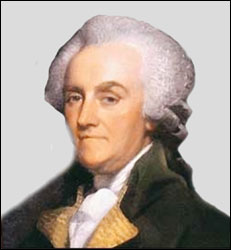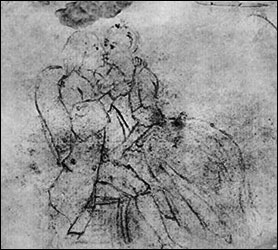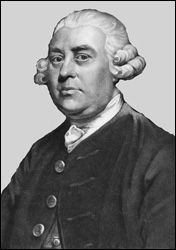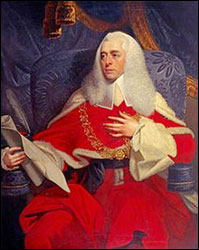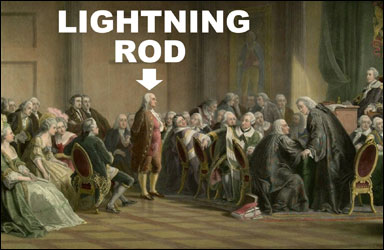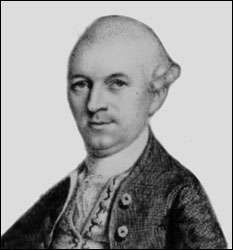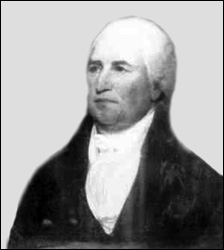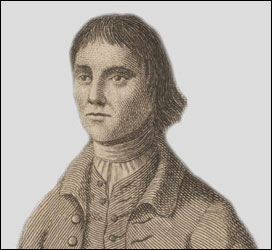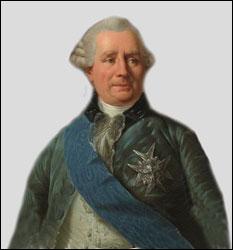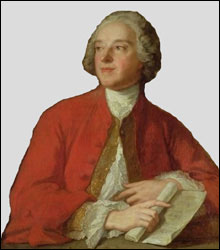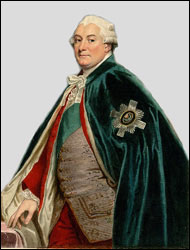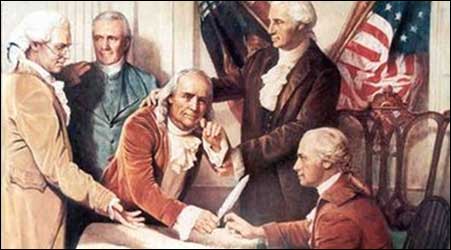FRIAR FRANKLIN'S CODE NAME WITH THE JACOBITE BRITISH SECRET SERVICE WAS "MOSES" AND HIS CODE NUMBER WAS 72....JUDAH ISCARIOT DESPERATELY WANTED TO BE A PROPERTY OWNER IN OLD JERUSALEM AND BEN MOSES DESPERATELY WANTED TO BE A PROPERTY OWNER IN THE NEW JERUSALEM!! |
According to Ben Franklin's Poor Richard's Almanack, the world was 5682 years old in 1733.
The name France means FREE....The Hebrew name BENJAMIN means "son of my right hand." Benjamin was the youngest son of Jacob and Rachel and the last of the 12 sons of Israel (Genesis 35:18).
The name Franklin came from a group of landowning English freemen known as Franklins. The name Franquelin was common in the province of Picardie from which many families had emigrated to England.
Ben Moses was chosen to lead the 13 colonies into the "Promised Land" of the "Holy Roman" Empire States of America, Inc. Thanks to General Jackson and the Bill of Rights that nightmare was postponed . . . but not cancelled!
At age 17, Ben Moses fled from Boston, Massachusetts, where he worked as a printer for his "tyrannical" older brother James. In 1776, he compared King George III to the tyrannical Pharaoh Ramesses II who enslaved the 12 tribes of Israel.
. |
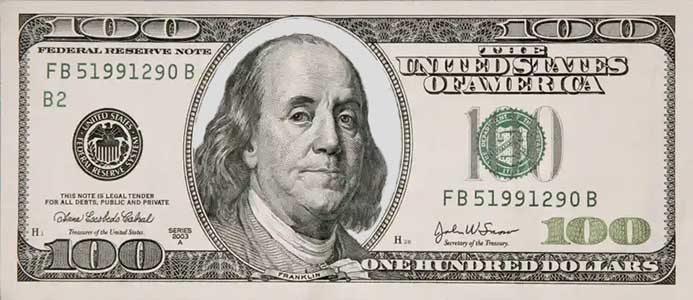 In 1742, Ben Moses (1706–1790) sailed to London from Philadelphia and while there he took vows as a Franciscan lay monk (Third Order of Hajji Francis of Assisi). Ben Moses wanted to remain in London but he was ordered to return to the Quaker City and establish a "Holy Roman" Empire in the New World. Instead of the 10 Commandments, Ben Moses had 13 precepts or maxims to lead the 13 colonies to the "Promised Land." |
The lusty youth returned to Philadelphia after 2 years and he fathered a son with a Read household maid named Barbara. Barbara had an untimely demise and was buried in an unmarked grave....Only the Day of Judgment will reveal her true identity!
The Friar then contracted a common law marriage with Deborah Read. The couple adopted the boy, and named him William. William later because the Loyalist governor of New Jersey, but his father persecuted his own bastard mercilessly because he remained true to his Loyalist oath to King George III.
Common law marriages were illegal in England because bans had to be posted for 3 weeks beforehand to make sure that the couple were not kissin' cousins!
|
In 1757, Franklin sailed to London again with his son William in tow. He stayed at 36 Craven Street on the Strand. Two-faced Franklin was the most hypocritical man to ever disgrace the New World.
Pennsylvania was a proprietary colony under the king's jurisdiction, and the Penn family were hereditary proprietors. Freedom of religion was guaranteed to all . . . except Roman Catholics....Franklin's main objective in London was to abolish that charter and annex the colony to the Jacobite controlled Parliament.
|
Additionally "Dr." Franklin was a phony "scientist".....All his "inventions" were shared with him by his fellow friars in Europe in order to establish his reputation as a polymath and Renaissance man!
One of his most powerful patrons in London was a Jacobite printer and publisher named William Strahan.
|
Friar Franklin was not invited to the coronation of King George III in October 1760. He had to purchase a ticket and watch from the gallery. That didn't bother him because he believed that King George III was a heretic and usurper.
Friar Franklin left London for Philadelphia in August 1762. During his 5-year stay he was able to lay the foundation for the Revolution that commenced in 1775.
Franklin knew that London was the hub of the Jacobite conspiracy so he left again for London in 1765. Naturally, he did not take his common law wife Deborah along.
Alexander Wedderburn, 1st Earl of Rossyln, was another Jacobite conspirator who worked closely with fellow Scot William Strahan.
|
Franklin was appointed agent for Massachusetts without the consent of Governor Thomas Hutchinson (1711–1780) and he made public some letters that the governor had sent to the Privy Council in London. Coincidently, it was just when news arrived in London of the Boston Tea Party which had taken place on December 16, 1773.
|
Franklin left London once more in 1775, claiming that his treatment by the Privy Council left him no option but to seek for a permanent break from the British Empire!
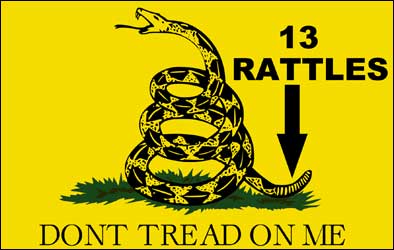 Ben Moses believed that the rattlesnake with 13 rattles was an appropriate symbol for his New World "Holy Roman" Empire States of America, Inc. |
Ominously, there were 13 men at the Last Supper until Judah Iscariot departed the Upper Room to betray the Messiah for 30 pieces of silver.
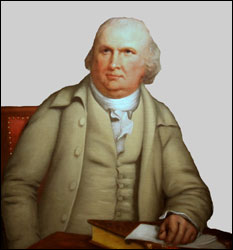 "Financier of the Revolution" Robert Morris (1734–1806) was born a bastard in Liverpool, England. Morris, Jr. was the son of Morris Senior and his mistress Elizabeth Murphy. Morris Senior shipped tobacco to Liverpool from Oxford, Maryland, and he imported slaves from Africa to harvest his cash crop. Morris Senior was sent to "Purgatory" at the young age of 39, leaving his vast fortune to Junior. At the young age of 21 "Moneybags" Morris became a full partner in the Philadelphia merchant of death firm of Willing Morris & Company. |
Morris was paymaster for the Revolutionaries, but George Washington agreed not to take a salary as long as Morris reimbursed him for his substantial expenses!
Morris couldn't help the fact that he was born a bastard but he didn't have to act like a bastard for his entire life!
|
LIke "Moneybags" Morris, Silas Deane was a New World Judah Iscariot because he loved money. Franklin held out the bait of fabulous profits working for the merchants of death firm of Willing & Morris:
Morris’s committee of trade offered Silas a 5 percent commission incentive on all mercantile committee contracts as the sole American purchasing agent in Europe. Morris was well aware that Silas was fairly well financially independent and the offer was “nice,” but not what interested Silas the most. So Morris even offered a personal partnership of Morris’s overseas contracts, which did get Silas’s attention. (Van Vlack, Silas Deane: Revolutionary War Diplomat and Politician, p.76).
When Deane left for France, Congress had not yet declared independence. He left his wife and large family behind in Connecticut as his only motive was life, liberty, and the pursuit of profits!
Before he left Philadelphia, Franklin recommended that he contact an old friend of his in London named Dr. Edward Bancroft:
Franklin also suggested that Deane contact his American friend in London, Dr. Edward Bancroft. Coincidently, Bancroft had been one of Deane's pupils when Deane was a schoolteacher in Hartford. Deane also knew Bancroft stepfather, David Bull, who owned the Bunch of Grapes tavern in Hartford where the Committee of Correspondence often met. Bancroft supported the American cause and could provide Deane with intelligence about the British government from his contacts in London. Deane was no doubt delighted and relieved to have someone familiar to him only a few days' travel from London. (Paul, Unlikely Allies, p. 130).
To avoid capture by the Royal Navy, Deane sailed to Spain and then crossed the Pyrenees into France. He finally arrived in Paris in July 1776. News of the Declaration of Independence was printed in a London newspaper in August, but Deane did not learn about it until November.
|
Dr. Bancroft met Deane in Paris and he briefed the spy on his top secret instructions from Friar Franklin. However, he needed an excuse to live in Paris permanently so that led to a false flag operation with mesmerized James Aiken alias John the Painter.
Because of his "scientific" background, Franklin was asked to investigate the theories of Friedrich Anton Mesmer (1734–1814), whose advocacy of a new method of healing led to the word "mesmerize." Mesmer was the father of mind control, brainwashing, psychology, or hypnotism which was added to poison in the deadly arsenal of the British Secret Service!
|
On March 10, 1777, Aitken was hanged from the mizzenmast of HMS Arethusa, and Dr. Bancroft fled to Paris. It was one of the most fiendishly clever false flag operations ever carried out by the British Secret Service!
Benjamin Franklin and Arthur Lee arrived in Paris in December 1777. Together with Deane the 2 commissioners comprised the official diplomatic delegation from the new United States.
Not all was harmonious with the 3 commissioners, Arthur Lee suspected that Franklin and Deane were British spies and to get him out of the way he was sent on dubious diplomatic missions to Spain and Prussia!
|
The Compte de Vergennes was not on the same page as his sovereign King Louis XVI. Vergennes was "educated" by Jesuits while the king's grandfather banned the firebrands in 1773. Additionally, the king had a good relationship with British monarch King George III.
|
After the devastating Seven Years' War, King Louis XVI did not want another world war with the British Empire. Many of his courtiers were veterans of that war, and they wanted revenge. Arms trading could easy trigger another war, so Roderigue Hortalez and Company operated as a private corporation, even though it was closely tied to the French government.
|
In September 1789, Deane was returning home on a ship when he suddenly had a stroke and expired within minutes. Deane had "loose" lips and Dr. Bancroft feared that he would blow his cover as a spy when he returned to Connecticut.
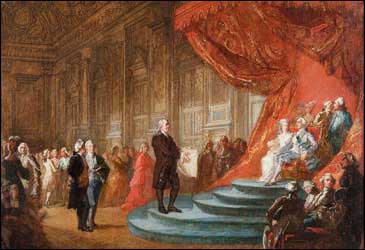 General Johnny Burgoyne and his Jacobite army "surrendered" at Saratoga, New York, in October 1777. As a result, in March 1778, King Louis XVI received the 3 commissioners and officially recognized the independence of the United States! |
Within days of the fake "surrender" of the Jacobite army, King Louis XVI decided to enter into negotiations with the Jacobites that resulted in a formal Franco-American alliance. The British ambassador left Paris and a state of war existed once more between the 2 bitter rivals.
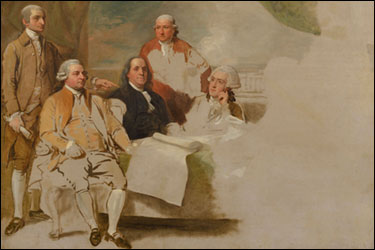 The 1783 Treaty of Paris ended the Revolutionary War. Signing for the United States were John Jay, John Adams, Ben Moses, Henry Laurens, and William Temple Franklin. |
Ben Moses finally left Paris on July 12, 1785. He stopped briefly in Southampton where he had a very cold encounter with his estranged son William who was living in exile in London. Father and son were never reconciled and Franklin finally arrived back in the City of Brotherly Love in September.
The final act of Ben Moses was to preside over the top secret "Constitutional" Convention which convened in May 1787.
|
Whereas Silas Deane's main motive was life, liberty, and the pursuit of profits, Franklin's main goal was life, liberty, and the pursuit of real estate. While still in London he was involved in a vast scheme to acquire millions of acres of land in the West. That real estate scam was called the Indiana or Walpole Company but the Revolution intervened and it was temporarily suspended.
Franklin was hoping that the top secret "Constitution would help his Jacobite descendents to acquire and settle that vast area with limitless natural resources.
Incredibly, that old fool decided to wait until he was DEAD to find out if the Gospel is true:
After the first of March Franklin's pained ceased, and he wrote his famous letter to Ezra Stiles, president of Yale. "You desire to know something of my religion. It is the first time that I have been questioned upon it. But I cannot take your curiosity amiss, and in few words to gratify it. Here is my creed. I believe in one God, Creator of the universe. That He governs it in His Providence. That He ought to be worshipped. That the most acceptable service we render him is doing good to His other children. That the soul of man is immortal, and will be treated with justice in another life respecting his conduct in this. These I take to be the fundamental principles of all sound religion, and I regard them as you do in whatever sects I meet with them."
"As to Jesus of Nazareth, my opinion of whom you particularly desire. I think the system of morals and his religion, as he left them to us, the best the world ever saw or is likely to see; but I apprehend it has received various corrupt changes, and I have, with most of the present Dissenters in England, some doubts as to his divinity; thought it is a question I do not dogmatize upon, having never studied it , and I think it needless to busy myself with it now, when I expect soon of having an opportunity of knowing the truth with less trouble. I see no harm, however, in its being believed, if that belief has the good consequence, as it probably has, of making his doctrines more respected and better observed; especially as I do not perceive that the Supreme Being takes it amiss, by distinguishing the unbelievers in His government of the world with any particular mark of His displeasure." (Van Doren, Benjamin Franklin, p. 777).
Any Muslim or Edomite could subscribe to that creed, philosophy, or statement of belief....Don't be like that old fool Friar Franklin and wait until YOU are dead to find out that it is diametrically opposed to the Holy Scriptures!
Vital links
References
Currey, Cecil B. Code Number 72 Ben Franklin: Patriot or Spy? Prentice-Hall, Inc., Englewood Cliffs, New Jersey, 1972.
Isaacson, Walter. Benjamin Franklin: An American Life. Simon & Schuster, New York, 2003.
Kitman, Marvin. George Washington's Expense Account. Simon & Schuster, New York, 1970.
Paul, Joel Richard. Unlikely Allies: How a Merchant, a Playwright, and a Spy Saved the American Revolution. Penguin Press, New York, 2009.
Rappeye, Charles. Robert Morris: Financier of the American Revolution. Simon & Schuster, New York, 2010.
Ridley, Jasper. The Freemasons: A History of the World's Most Powerful Secret Society. Arcade Publishing, New York 2001.
Schaeper, Thomas J. Edward Bancroft: Scientist, Author, Spy. Yale University Press, New Haven & London, 2011.
Van Doren, Carl. Benjamin Franklin. Viking Press, New York, 1938.
Van Vlack, Milton C. Silas Deane: Revolutionary War Diplomat and Politician. McFarland & Company Publishers, Jefferson, North Carolina, 2013.
Warner, Jessica. John the Painter: Terrorist of the American Revolution. Thunder Mouth Press, New York, 2004.
Winter, Allison. Mesmerized: Powers of Mind in Victorian Britain. University of Chicago Press, Chicago, Illinois, 2000.
Wyckoff, John. Franz Anton Mesmer: Between God and the Devil. Prentice-Hall, Englewood Cliffs, New Jersey, 1975.
Copyright © 2022 by Patrick Scrivener
or personal
